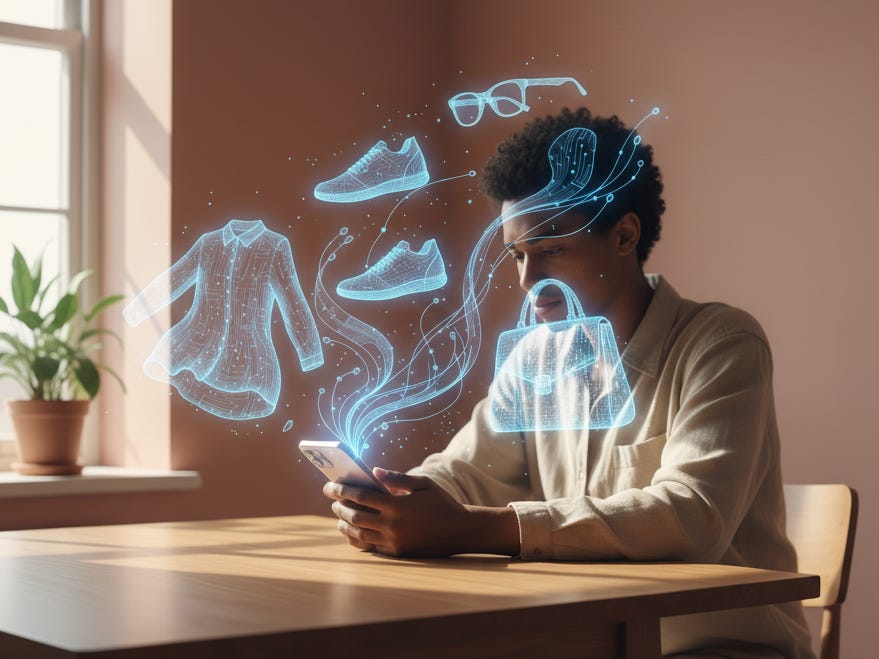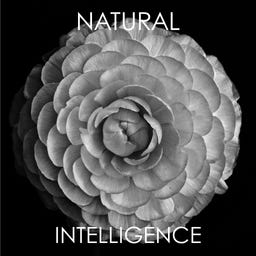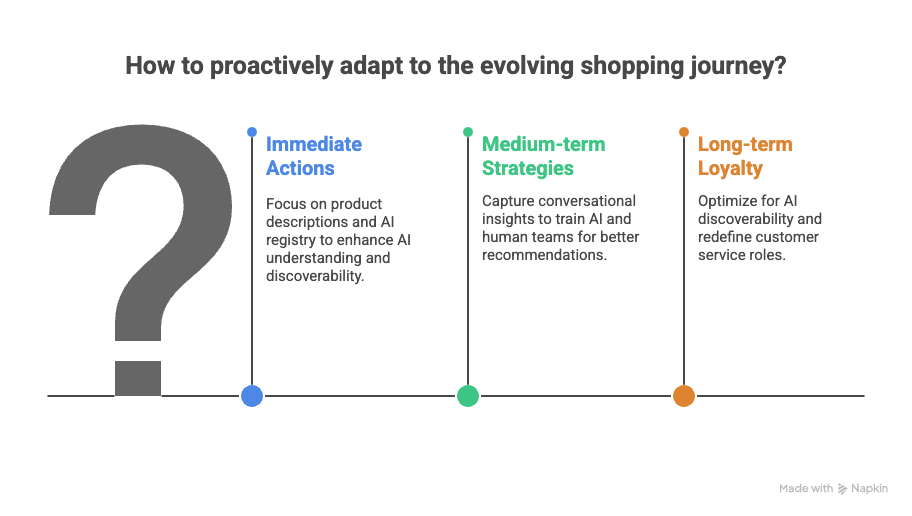The Rise of AI Shopping: What This Means for Business Leaders
Why the shift from search to "Conversational Commerce" or c-Commerce affects every business
Thanks for reading! To access our community, full prompt library, coaching, and AI tools saving leaders 5-10 hours per week, check out our Premium Hub.
Have you ever watched a customer make a purchase decision and wondered what invisible forces were actually driving that choice?
Last week, a friend told me he bought three project management tools after asking ChatGPT what would work best for his team. He didn't compare prices or read reviews. He trusted the AI's advice.
This shift from traditional research to AI-guided decisions affects how people discover every type of solution, whether that's finding a consultant, choosing a nonprofit to support, or finding a startup to invest in.
Today, I'm sharing insights from JHong, who writes the Natural Intelligence newsletter and previously worked at Ralph Lauren. Jennifer's been tracking these changes in real time, and her analysis reveals what leaders across all sectors need to understand about this fundamental shift in how people make decisions.
In this article, you'll discover:
How the traditional commerce funnel (path from discovering a product to buying) is collapsing in real time
Why people are developing loyalty to AI personalities, not just brands
The psychology behind why AI recommendations feel more confident than traditional research
Practical steps to ensure AI systems recommend your solutions
Here is JHong.
The Fast & The Frictionless: The Upswing of AI-Powered Shopping
Have you been influenced to buy something online by ChatGPT?
My answer: Beginning just this year, yes, I have. And as someone who’s marketed some major retail brands and is fascinated by AI, this evolution is moving fast. Soon, it’ll be a new monetization stream for multiple AI and transaction players. And a new medium to consider for marketing, for anyone who sells a product or service.
I write Natural Intelligence here because I'm fascinated by how AI literally touches everything. But what struck me most was its accuracy as a mirror for humanity – we are, for better or worse, seeking frictionlessness in all of life's pursuits. After dozens of posts, and no shortage of angles (from context engineering to attachments leading to AI marriages), it’s fair to say AI exposes how much we still struggle even though life’s conveniences continue to rise.
Think online shopping is tough? Well, it’s about to take a new, even more efficient, consumer path.
I keep coming back to the question of “how do we stay human?” as we collaborate with this new tool, and also “how do we live with AI?” as it begins to pervade every part of life. Today, rather than debating the philosophical, we are going to look at how shopper behavior is starting to change and how leaders can prepare accordingly.
From Search To Conversation
In late July, OpenAI announced its pilot with Shopify to develop native checkout (buying directly within an app without being redirected) within ChatGPT. This wasn't just another e-commerce integration – it signaled that we might skip the entire advertising layer. Instead of moving from search recommendations to paid ads in AI platforms, we're jumping straight to “ask and buy.”
We’re witnessing the collapse of the traditional commerce funnel in real time.
The old model: intent → ad → link → checkout is being replaced by a single interface that remembers you, advises you, and sells to you.
This changes the landscape significantly:
For Google: AI eats search intent before it ever hits a keyword auction (How Google decides which ads to show based on search terms).
For Amazon: AI cuts to the sale without a marketplace middleman.
For brands: The question shifts from “Where are we placing ads?” to “Are we inside the AI making the recommendation?”
With the AI platforms taking a commission on any sales, this creates a meaningful method to now monetize the free tier of users.
And others are moving even faster than OpenAI. Visa, alongside OpenAI and other tech partners, is exploring AI-enabled “delegated” shopping agents through its Visa Intelligent Commerce platform, enabling routine purchases via AI with user approval (Here).
Microsoft Copilot actually announced their native checkout enhancements earlier than OpenAI, back in early June, but that didn’t catch my attention till now.
Shoppers Are Already Adapting
In my personal example with my first AI-influenced purchase, I bought some K-Beauty products after a brief reaction to niacinamide and retinol.
Here's what was different about this purchase: I didn't open five browser tabs comparing products on Sephora, read dozens of reviews, or check ingredient lists against my skin type…
Instead, I had uploaded a selfie where my specific reaction was apparent – redness, irritation – and ChatGPT diagnosed my sensitivity to certain acids, recommended three specific products with detailed explanations of why each would work for my situation. I then told it that K-Beauty works better for me, and new recommendations popped up. Within a few minutes, I'd purchased three new items that have never been part of my skincare regimen.
The traditional shopping journey would have taken much longer and maybe a visit to a derm: research, comparison, second-guessing, cart abandonment, maybe coming back later.
The AI-mediated journey took minutes and felt more confident, not less.
The AI that will win this new game will not just provide recommendations. They’ll be able to marry persistent memories about the user (what ingredients cause irritation, what brands do I prefer, where do I have loyalty points) + intent rich queries from the user (detailed prompts that signal “I am ready to buy this,” for example, “I’m planning a trip to Turks & Caicos and need travel-sized toiletries.”) + seamless checkout.
Which leads to another question. How much do we trust these platforms with purchase power?
It turns out a lot.
Conversational commerce (c-Commerce) is enabling real-time, AI-influenced buying that outpaces browsing. c-Commerce grew dramatically between 2021 and 2023, especially among Gen Z, thanks to generative AI advances (Here).
But the psychology runs deeper than convenience. Let's look at what's actually changing in how humans make purchase decisions.
AI-powered conversational systems are already proving their worth: companies report up to a 10× boost in conversions, along with lower costs and fewer abandoned carts (Here). This reflects a broader shift: loyalty is no longer just to brands, but to the AI that recommends and facilitates purchases.
Choice overload is a well-documented psychological phenomenon – when faced with too many options, humans often choose nothing at all. It’s called The Paradox of Choice (it’s an oldie, but a goodie, I recommend). AI conversational commerce eliminates this friction by curating recommendations based on personalized data and specific needs.
The results are striking: businesses implementing c-Commerce report 35% higher conversion rates and 25% higher customer satisfaction. In beauty retail specifically, AI reduces friction through auto-fill, intelligent upselling, and personalized repurchase prompts (Here).
At my work, the adage is often “fish where the fish are swimming.” The market for AI-mediated shopping is projected to grow from $11B in 2024 to $17.5B by 2029, and potentially $52.8B by 2034 (Here)
The Cultural Shift is Already Here
We're witnessing something totally new: the collapse of comparison shopping culture. For decades, being a "smart consumer" meant doing your research, reading reviews, comparing prices across platforms. That behavior is becoming obsolete.
Think about it: when was the last time you researched a restaurant by reading Yelp reviews versus asking AI for a recommendation based on your specific preferences, dietary restrictions, and mood? The AI doesn't just tell you what to choose – it explains why it's right for you specifically. We provide more context with our prompts, AI in turn returns a more personalized option.
This mirrors how we've already adapted to algorithmic curation in entertainment. We don't browse Netflix catalogs anymore; we trust the algorithm to surface relevant content. I prefer the FYP (For You Page - TikTok's personalized content feed) on TikTok to the Following page. The same psychology is now extending to commerce, but with higher stakes and more personal data.
Here's what happens next: people develop preferences for specific AI “shopping personalities.” Users might become loyal to ChatGPT's recommendations versus Claude's versus Gemini's, based on past success and conversational style. It's like having a favorite salesperson, except this one remembers every conversation and is never rude or too busy to help.
And recall some of the backlash surrounding GPT-5, that it had become less friendly? The empathy level of each model update will now also impact the ease of shopping with your AI assistant.
These aren’t slim gains - they’re order-of-magnitude shifts. Now is the time to audit how your customer journey can plug into conversational channels, invest in structured product data that feeds AI systems, and train teams to complement rather than compete with algorithmic recommendations.
Ready to converse?
What does this mean in practical terms when you want to be proactive, not flat-footed, as the shopping journey begins to forge a new route?
Immediate: Have you submitted your products to OpenAI's registry? Is your website structured so it can be easily parsed by both humans and AI systems? Review your product descriptions – are they detailed enough for AI to understand not just what you sell, but when and why someone should buy it?
Medium-term: Start capturing conversational insights. What questions do customers ask? What hurdles do they raise? What context do they provide about their needs? These transcripts become training data for both your human teams and the AI systems making recommendations. Consider: if ChatGPT were your best salesperson, what would it need to know about your products to sell them effectively?
Long-term: Rethink loyalty strategies entirely. Your most valuable “customer” may be the algorithm deciding which products to recommend. This means optimizing for AI discoverability the same way you once optimized for Google search. It also means your customer service team needs to understand they're not just solving problems – they're competing with AI relationships for trust and ongoing engagement.
Leaders will need to think less about campaigns and more about ecosystems: how to become the default answer when a shopper asks their AI agent for help. Over time, this means reshaping brand-building around trust signals, seamless integrations, and maintaining a “relationship with the recommender” as much as with the end consumer. Which could open up a whole new territory of marketing as well.
Some brands are already there. Ralph Lauren, where I used to work, launched “Ask Ralph” - an AI feature that delivers personalized style advice by learning from the brand's 60-year archive and philosophy. Instead of fighting AI-mediated commerce, they're embracing it. They're training the AI to be like Ralph, not just to sell Ralph Lauren products.
The implications vary by industry. In beauty and wellness, AI excels at personalized recommendations based on specific concerns. In travel, it can synthesize preferences about budget, timing, and experience type. In B2B services, it can match solutions to specific business challenges without requiring lengthy discovery calls.
Some industries face bigger disruption than others. Retail categories built on comparison shopping – electronics, insurance, financial services – will see the most dramatic shifts. Industries built on relationship and trust – luxury goods, professional services, complex B2B solutions – may find AI augments rather than replaces their existing sales processes.
B2AI2C (Business-to-AI-to-Consumer), perhaps?
Closing Thoughts
This shift isn't really about technology – it's about human psychology and how our trust in AI creates new revenue streams. We're not just changing how we shop; we're changing how we make decisions. The recommendation becomes the relationship, the algorithm becomes the advisor.
Leaders who understand these behavioral changes can navigate the transition successfully. The companies that thrive won't be those fighting against AI-mediated commerce, but those that embrace it.
They'll be the brands that help AI help their customers, the ones that recognize B2AI2C (Business-to-AI-to-Consumer) isn't just a clever acronym – it's the new reality of how humans buy.
The future of commerce isn't about replacing human connection. It's about augmenting it with intelligence that remembers, learns, and serves. That's still fundamentally human, just amplified.
Update - September 29:
As of Monday, OpenAI has rolled out native checkout inside ChatGPT. That means the “pilot” I mentioned above with Shopify in July has now gone live. This is no longer a thought experiment - you can now ask, get recommendations, and complete a purchase without leaving ChatGPT. It’s the clearest sign yet that conversational commerce has officially arrived.
For more on the SEO/GEO (Search Engine Optimization/Generative Engine Optimization) evolution, from its infancy to 2025, read Crazy Rich Algorithms - The Remix
If You Only Remember This
Trust is transferring from traditional research to algorithmic advice. Your customers are increasingly asking AI what to buy, not Google where to compare prices. This affects every business, not just retailers.
The question shifts from "Where should we advertise?" to "How do we become the solution AI recommends?" This means rethinking how you describe your services, structure your information, and build relationships with the systems making recommendations.
Conversational commerce isn't just about selling products. It's about how people discover solutions to their problems. Whether you're leading a nonprofit looking for donors, a church connecting with community members, or a consultant attracting clients, people are increasingly turning to AI for guidance.
The leaders who thrive won't fight this shift; they'll embrace it. The future belongs to organizations that help AI help their audience, not those trying to compete with algorithmic recommendations.
How is AI changing the way people discover what you offer?
PS: Many subscribers get their Premium membership reimbursed through their company’s professional development $. Use this template to request yours.
Let’s Connect
I love connecting with people. Please use the following connect, collaborate, if you have an idea, or just want to engage further:
LinkedIn / Community Chat / Email / Medium








We're developing loyalty to AI shopping personalities (ChatGPT vs Claude) the same way we trusted favorite salespeople. Except this one never forgets your preferences and never has a bad day.
Just wait another two years or so, when consumer-side AI agents start becoming mainstream at the same time as digital IDs. Now the consumer has a tool in their hand that can go search for, say, a rental car hire, communicate with all rental companies, barter for better prices/more loyalty points/free extras/etc and arrange and pay for the booking - at the same time only agreeing to share a limited amount of personal data with a strict time limit on its use. Brands that fail to build experiences, emotion, empathy, and humanity into their offerings will not be differentiated and will be commoditised by the agents. Buying will be a three-way relationship, brands will have to communicate with AI better than they do with consumers.